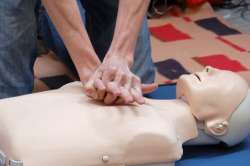Alarming! 98 pc Indians not trained in basic life-saving CPR technique
Despite cardiovascular diseases (CVDs) turning into the leading cause of deaths in India, 98 per cent of the country’s population is not trained in the basic life-saving technique of Cardiovascular Resuscitation (CPR), which is the

Despite cardiovascular diseases (CVDs) turning into the leading cause of deaths in India, 98 per cent of the country’s population is not trained in the basic life-saving technique of Cardiovascular Resuscitation (CPR), which is the most crucial and basic procedure to save a life in the event of a Sudden Cardiac Arrest.
The findings, revealed in a survey conducted by Lybrate, an Indian online doctor consultation platform, point to figures of the World Health Organization that say India has over 30 million heart patients, and about 1.7 million Indian hearts, stop beating every year.
It is estimated that by 2020, India will be one of the countries globally to be facing a grave threat relating to CVDs.
In India, Sudden Cardiac Arrest (SCA) is a major cause of death due to CVD, and shockingly 60 per cent of the people who suffer an SCA succumb to it even before they reach hospital.
The pan India survey shows that less than 2 per cent of the 100,000 surveyed agreed to be knowing the technique, while only 0.1 per cent said they have ever performed it on someone in case of an emergency.
Notwithstanding the fact that people in metropolitan and Tier 1 cities are more proactive about their health, the knowledge of CPR is dismal even among them, with 95 per cent of the people claiming to have no knowledge about administration of the procedure.
CPR is performed in emergency conditions when heart stops beating. Administering it in the event of someone becoming unresponsive, including when a person suffers an SCA, in the initial 5-6 minutes helps revive the heart and saves the brain from a permanent damage.
Countries like the United States, Europe, Japan and Singapore have mandated Hands-only CPR in their school curriculum, but in India such a policy step still seems far away.